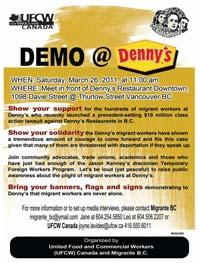Migrant workers plight to be showcased at Vancouver meet

Community advocates, trade unions and academics are preparing for a loud yet peaceful march to raise public awareness of the plight of migrant workers at Denny’s restaurants in B.C.
The march will take place on March 26, 2011 at 11:00 am in front of Denny’s Restaurant in Downtown, Vancouver, the organizers said.
The rally is being held as the 13th National Metropolis Conference takes place at the Sheraton Wall Centre in Vancouver.
The conference with the theme “Immigration: Bringing the World to Canada” is expected to attract scores of experts to discuss the scale and nature of Canada’s immigration system and the policies and practices that have emerged to foster the socio-economic inclusion of new Canadians.
The United Food and Commercial Workers Canada (UFCW), the Agriculture Workers Alliance (AWA) and community allies such as Migrante B.C. and Migrante Canada will be mobilizing once again at Metropolis 2011 to ensure that the federal government and its provincial allies does not sell the Temporary Foreign Workers Program (TWFP) as a model program because we know that it is a national embarrassment, a statement from the group said.
“As one of the largest immigration based conferences in Canada, one of the primary impetuses for our strong and vocal attendance at Metropolis is to ensure that the story and allies of migrants are heard loudly. Whether it is at plenary discussion or workshops, UFCW Canada delegates and allies in Montreal in 2010 and Calgary in 2009 were able to decisively respond to the misinformation campaign promoted by the federal and some provincial governments” said UFCW Canada President Wayne Hanley.
“In Vancouver, we will again strategically mobilize to ensure that such myopic analysis which commodify migrant workers with little care for their well being, are not left unanswered.”
The ‘Demo at Denny’s’ follows a lawsuit by 50 Filipino migrant workers recruited to Canada under the Temporary Foreign Workers (TFW) program.
They have filed a $10 million class action suit against Denny’s restaurants in British Columbia, charging the company did not live up to the employment contract the workers signed before they arrived from the Philippines. The suit was filed in the B.C. Supreme Court on January 7, on behalf of the Filipino migrant workers employed at Denny’s from 2006 until the present.
One of the lawyers representing the workers, Charles Gordon, alleges that “the workers came to Canada, mainly as cooks and servers, to take jobs at Denny’s Restaurants in B.C. but were required to pay approximately $6,000 each to an agency that was recruiting employees for the Defendants, and the workers have not received the hours of work, overtime pay, air travel and other conditions they were promised.”
“These workers were encouraged to come to Canada with a set of promises that have never been met – they have done their part but the Denny’s has not lived up to their end of the deal,” says Christopher Foy, another member of the legal team.
“The federal government’s Temporary Foreign Workers program continues to be a shameful treadmill that lures workers to Canada, and then leaves them defenseless and vulnerable,” said Hanley.
“The fact that the Denny’s workers have been forced to go to court is yet another blatant example of how the exploitive TFW program turns a blind eye to what happens to migrant workers once they arrive in Canada.”
Denny’s Canada has released a statement saying it will investigate the allegations and all alleged incidents described.
“We have always adhered to the employment standards guidelines and continue to be strong supporters of workplace ethics,” marketing director Brent Armstrong was quoted as saying after the lawsuit was filed.
Leo Alejandria of Migrante BC (Canada) said given that many temporary foreign workers are threatened with deportation if they dared speak up; it is inspiring that the Denny’s employees have come forward to shed light on the exploited plight of these workers in Canada.
There were approximately 280,000 TFWs in Canada last December 2009, with those from the Philippines comprising the largest number at around 51,000, according to Citizenship and Immigration Canada.
B.C. had 44,000 temporary foreign workers in 2009.
Common issues for many TFWs include low wages, lack of job security, lack of benefits, vulnerability to contract violations, separation from families and sub-standard living conditions.
“Given that the Aquino administration in the Philippines is bent on heightening further its export of workers to Canada and around the world, it is certain that the number of TFWs facing conditions similar to that of the Denny’s workers will increase,” said Alejandria.
“As such, MIGRANTE-BC recognizes the importance of this class suit to all TFWs across Canada. This is a precedent setting case whose impact will surely reverberate around the country, in the Philippines and beyond.”






